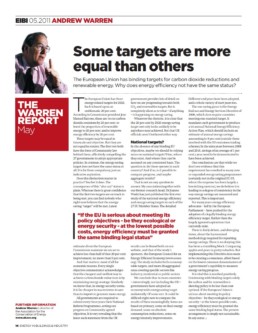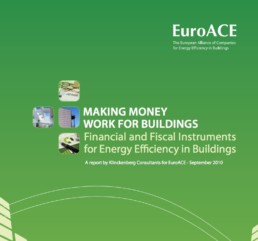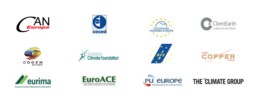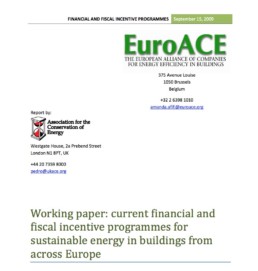Some targets are more equal than others
The European Union has binding targets for carbon dioxide reductions and renewable energy. Why does energy efficiency not have the same status?
The European Union has three energy-related targets for 2020. Each is based upon an emblematic 20 per cent. According to Commission president Jose Manuel Barroso, these are: to cut carbon dioxide emissions by 20 per cent; to boost the proportion of renewable energy to 20 per cent; and to improve energy efficiency by 20 per cent.
CEOs Slam Lack of Political Will on Energy Efficiency as Part of New ‘Renovate Europe’ Campaign
Industry leaders of some of Europe’s leading companies and organisations published last week an open letter to EU Member State energy ministers urging them to refocus Europe’s energy policy on promoting the energy efficiency of buildings.
Europe’s energy ministers meet today in Budapest, Hungary, to discuss Europe’s energy strategy to 2050. The letter, which is being published in Le Monde (FR), Financial Times (UK), Berlinske (DK), Handelsblatt (DE), and the European Voice (EU) warns that any effective European energy policy should give reducing energy demand as much political weight as ensuring energy supply.
Despite environmental disasters as well as turmoil in the energy market, recent weeks have seen European governments seek to water down attempts to propose ambitious Europe wide measures that promote the energy efficiency of buildings. For example, European governments have sought to push back on a suggested requirement on governments to renovate 3% of public buildings each year. Governments across Europe are already expected to fail to meet previously agreed targets for achieving energy efficiency improvements by 2020.
“Energy efficiency is the silver bullet to our energy challenges that governments seem unwilling to fire.” said Tony Robson, CEO of Knauf Insulation and one of the signatories of the letter. “The deep renovation of our buildings will reduce our exposure to foreign energy shocks, combat climate change and create 2 million new jobs. It is a political no-brainer but so far there has been very little action. This is why we have joined the Renovate Europe Campaign.”
Europe’s buildings consume around a third of its energy, around the same amount of energy produced by the nuclear and coal sectors together. The European Commission estimates that up to 2 million new jobs would be created through the deep renovation of Europe’s existing buildings.
“Energy ministers have a once in a generation opportunity to shape Europe’s future. We can continue to build increasing numbers of power stations and increase our energy imports or we can start to take real action to reduce demand. The costs of inaction are clear to all.” said Jakob Sørensen, Senior Vice President at Rockwool International, a member of Renovate Europe.
RENOVATE EUROPE Campaign slams the EU Council on consistent attempts to water-down critical energy efficiency measure
Industry leaders of some of Europe's leading companies and organizations today criticised the EU Council over repeated attempts to water-down effective energy efficiency measures. The criticism comes as the EU Council's energy working party gathers to discuss the draft Council conclusions on the "Energy Efficiency Plan 2011".
The conclusions document published last week showed some heavy back-pedalling from Member States on key energy efficiency measures, especially regarding a requirement for public authorities to refurbish at least 3% of their buildings each year. The draft Council conclusions also hold back on the necessity to speed up improvements on existing buildings.
This is all the more concerning as it blatantly denies public opinion, industry, and environmental groups, who are all overwhelmingly in favour of ambitious energy efficiency measures. A survey published just last week by the European Parliament shows that 80% of EU citizens support mandatory energy savings targets, while organizations who responded to the consultation on the “Energy Roadmap 2050” placed energy efficiency as top priority for further energy policy developments in the EU.
“Energy efficiency is the silver bullet to our energy challenges that governments seem unwilling to fire.” said Tony Robson, CEO of Knauf Insulation and one of the signatories of the letter. “The deep renovation of our buildings will reduce our exposure to foreign energy shocks, combat climate change and create 2 million new jobs. It is a political no-brainer but so far there has been very little action. This is why we have joined the Renovate Europe Campaign.”
Europe’s buildings consume around a third of its energy, around the same amount of energy produced by the nuclear and coal sectors together. The European Commission estimates that up to 2 million new jobs would be created through the deep renovation of Europe’s existing buildings.
“Energy ministers have a once in a generation opportunity to shape Europe’s future. We can continue to build increasing numbers of power stations and increase our energy imports or we can start to take real action to reduce demand. The costs of inaction are clear to all.” said Jakob Sørensen, Senior Vice President at Rockwool International, a member of Renovate Europe.
Making Money Work For Buildings
Well-designed financial and fiscal programmes for energy efficiency improvement projects in buildings have a cost-effectiveness to governments of around €20-25/tonne of carbon emissions mitigated, which is lower than virtually all alternative non-traded carbon abatement measures. That is the conclusion of this research report from EuroACE which looked at over 100 instruments currently in place across the EU representing tens of billions of Euros of investment in energy efficiency.
Open Letter to European Heads of State on the Occasion of the June European Council’s Discussion on EU 2020 Strategy
Brussels, 18 June 2010
EU Energy Saving Target Key to Achieving the New Europe 2020 Objectives
As representatives of a range of business and professional associations and civil society interests, we are firmly convinced of the multi-faceted benefits of energy saving and consider that the EU must urgently step up its action in this regard.
We regret that the European Council did not pay more attention to energy saving this week, as it gathered in Brussels to endorse the Europe 2020 strategy for steering the EU toward a smart, sustainable and inclusive economic future. Improving energy efficiency to help meet the EU’s target of lowering energy use by 20% by 2020 is a win-win-win solution, which should be acknowledged as lying at the heart of the new 2020 objectives.
Meeting the existing 20% target could generate a million new, local jobs, greatly reduce imported energy dependency and help Europe and its businesses take the lead in the global race for innovative and sustainable products. It is also integral to the EU’s climate and energy objectives. Yet at current rates, only half of the target will be achieved. The consequence of this failure will be an unnecessary additional cost to consumers of 78 billion Euros annually at a time of severe budgetary constraints, an increase in the need for harsh and unpopular austerity measures and undermining the achievement of Europe's strategic goals[1].
Practices and technologies to achieve the necessary savings are already available. We call on you to urgently take the steps necessary to see that these solutions are acted upon. This means taking on a higher level of commitment and accountability for delivering on the existing 20% target.
Overcoming the barriers to energy saving requires a new impetus for targeted efficiency policies and programmes, alongside strengthened price signals. We consider that binding targets would help to establish this impetus, as has been demonstrated for other priority policy areas—for example in the case of renewable energy and air quality. We note that the European Parliament again called for such a target in its Resolution on the Europe 2020 Strategy, voted this week[2].
Even taking into account the economic recession and policies adopted since the 2006 Energy Efficiency Action Plan (EEAP), a three-fold increase in policy impact will be needed to achieve the 20% target. The next 12 months represent a narrow window of opportunity: the forthcoming Energy Action Plan and review of the 2006 EEAP must set out the framework and new legislation to ensure that the savings gap is closed.
While many Member States will have to reduce budget deficits in the coming years, a 20% binding target for energy saving will help incentivise action in the most strategic areas, to the economic and environmental benefit of all Europeans. We hope that those benefits are at the forefront of European leaders’ minds and that energy saving will be made the first order priority for the EU’s economic recovery and new ‘EU2020’ strategy.
[1] Figures cited in this letter are from the preliminary findings of the forthcoming study ‘Energy Savings 2020’ by Eco fys and Fraunhofer ISI, to be published in September 2010.
[2] The European Parliament resolution on the EU 2020 Strategy (P7_TA(2010)0223) is at http://www.europarl.europa.eu/sides/getDoc.do?pubRef=-//EP//TEXT+TA+P7-TA-2010-0223+0+DOC+XML+V0//EN&language=EN
ABOUT US
- CAN Europe (Climate Action Network Europe) is an umbrella organisation for 130 non-profit, non-governmental organisations across Europe, which unite to prevent dangerous climate change. CAN-Europe is recognized as an established civil society voice in EU policy and in the UN climate negotiations. Website: climnet.org
- CECED (European Committee of Domestic Equipment Manufacturers) promotes the industry's mission to increase the performance while reducing the environmental impact of the appliances. Website: ceced.org
- CECODHAS (The European Liaison Committee for Social Housing) is the European Committee for social and cooperatives housing, a network of national and regional social housing federations. Website: cecodhas.org
- ClientEarth is an organisation of activist lawyers committed to securing a healthy planet and bringing together law, science and policy to create pragmatic solutions to key environmental challenges. Website: clientearth.org
- COGEN Europe is the European association for the promotion of cogeneration. It represents the interests of the cogeneration industry, users of the technology and promoting its benefits in the EU and the wider Europe. Website: cogeneurope.eu
- EEB (The European Environmental Bureau) is the largest federation of environmental citizens’ organisations in Europe with over 150 member organisations. Its aim is to protect and improve the environment of Europe and to enable the citizens of Europe to play their part in achieving that goal. Website eeb.org
- ECF (European Climate Foundation) is a philanthropic organization that aims to promote climate and energy policies that reduce Europe’s greenhouse gas emissions and help Europe play an even stronger international leadership role in mitigating climate change. Website: europeanclimate.org
- European Copper Institute is a non profit organisation representing the world's mining companies and the European copper It aims to raise public awareness of copper's value to society and to the environment. Website: www.eurocopper.org
- EuroACE (The European Alliance of Companies for Energy Efficiency in Buildings) represents Europe's leading companies involved with the manufacture, distribution and installation of energy savings goods and services for buildings. Its mission is to help Europe move towards a more sustainable pattern of energy use in buildings. Website: euroace.org
- Eurima (European Insulation Manufacturers Association) represents the interests of all major mineral wool producers throughout Europe. Its mission is to create a favourable business environment for mineral wool insulation, by promoting the common interests of this industry and working for positive regulations and standards. Website: http://www.eurima.org
- PU-Europe is the European association representing the polyurethane insulation industry. Polyurethane insulation helps to save energy in a wide variety of applications in buildings, district heating, cooling and refrigeration, and industrial syste Website: www.pu-europe.eu
- The Climate Group is an independent, not-for-profit organisation, working internationally with government and business leaders to advance smart policies and technologies to cut global emissions and accelerate a low carbon economy. Website:theclimategroup.org
Working Paper Financial and Fiscal Instruments for Energy Efficiency in Buildings
Learn more about the existing financial and fiscal incentive programmes for sustainable energy in buildings in the different EU Member States in this Working Paper. The survey reflects the wide-range of measures that can be deployed to incentivise energy efficiency investment in buildings, as well as the great potential for information exchange and sharing of best practice within the EU.





